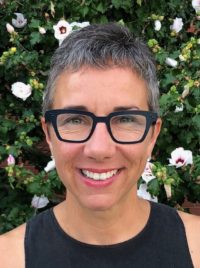
Susan Trollinger is professor of English at the University of Dayton where she teaches courses on writing and rhetoric. She earned her Bachelor’s degree in Communication Arts from the University of Wisconsin-Madison and her Master’s and PhD in Rhetoric and Communication from the University of Pittsburgh. Her first book, Selling the Amish: The Tourism of Nostalgia (Johns Hopkins University Press, 2012), explores Amish Country tourism especially in eastern Ohio. In her more than ten years of research for the book, she learned a great deal about Amish culture and its significance for all who are not Amish, which she enjoys sharing with others. Her second book, titled Righting America at the Creation Museum (Johns Hopkins University Press, 2016) and co-authored with her husband, William Vance Trollinger, Jr., provides a close reading of the arguments and appeals at the Creation Museum in Petersburg, Kentucky as well as situates those arguments and appeals within the long history of Protestant fundamentalism in the US. She has been interviewed in a number of media outlets including CSpan-2’s BookTV, RadioWest, the Washington Post, and GQ.
Rebels in Corsets: The Embodied Rhetoric of the Women’s Suffrage Movement
The story of the women’s suffrage movement is often told (even by US historians) as a peaceful transition by which white male politicians happily gave women the right to vote. This could not be further from the truth. The movement for women’s suffrage was a 72-year struggle that demanded a great deal from women emotionally, politically, and physically. This lecture looks at what it was like to be a woman in the 19th century with little power to change her circumstances because she did not have access to the ballot box, how it was that women became convinced in the 1840s that it was time to take on that struggle, and how they finally won it through rhetorical strategies that might not look radical to us now but then appeared so radical as to have been called “disgusting.”
Moving Off the Farm and Trying to Stay Amish
By now most Americans likely know something about Amish life—that the Amish depend on horse and buggy for transportation, that they do not plug into the electrical grid, that their cuisine is delicious, and that they live according to a much slower pace of life than most Americans do. What many people do not know is that Amish life is changing in some very significant ways due economic pressures that have pushed them off the farm. In the course of this presentation, we will look at what Amish life has been like for the better part of a century in the US and how it is changing now as a result of what has been called “the Amish industrial revolution.” We will explore these changes and ask the question—can the Amish remain Amish?
TO SCHEDULE A PRESENTATION , PLEASE CONTACT:
Susan Trollinger
strollinger1@udayton.edu
Speaker Applications
If your organization would like to book a speaker, first contact the speaker to confirm program dates, times, and whether or not the program will be offered virtually.
After you have confirmed scheduling details, submit a speaker request form to Ohio Humanities at least six weeks before the presentation takes place. Upon approval, we’ll send you a program agreement packet and ask you to pay the appropriate application fee to Ohio Humanities. Groups are limited to three Speakers Bureau programs per year.
Speaker Fee Structure
Non-profit organizations with an annual budget under $150,000 pay a fee of $50.00.
Non-profit organizations with an annual budget over $150,000 pay a fee of $250.00.
Schools (including colleges or universities) and corporate or private entities pay a fee of $400.00.
For any questions, please contact Program Officer Melvin Barnes at mbarnes@ohiohumanities.org.
